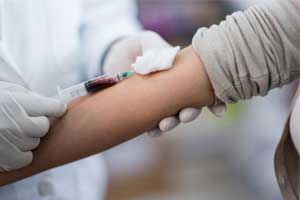- Home
- Editorial
- News
- Practice Guidelines
- Anesthesiology Guidelines
- Cancer Guidelines
- Cardiac Sciences Guidelines
- Critical Care Guidelines
- Dentistry Guidelines
- Dermatology Guidelines
- Diabetes and Endo Guidelines
- Diagnostics Guidelines
- ENT Guidelines
- Featured Practice Guidelines
- Gastroenterology Guidelines
- Geriatrics Guidelines
- Medicine Guidelines
- Nephrology Guidelines
- Neurosciences Guidelines
- Obs and Gynae Guidelines
- Ophthalmology Guidelines
- Orthopaedics Guidelines
- Paediatrics Guidelines
- Psychiatry Guidelines
- Pulmonology Guidelines
- Radiology Guidelines
- Surgery Guidelines
- Urology Guidelines
New blood test can predict risk of a second heart attack

Scientists at the Baker Heart and Diabetes Institute are in process of developing a blood test that quickly and easily detects whether a person is at risk of a second heart attack. They have identified plasma lipid biomarkers that improve upon traditional risk factors in predicting heart disease and stroke.
The test will be an easy and simple blood test just like a cholesterol test which could be operated out of hospital pathology laboratories that already contain the necessary equipment.
Professor Peter Meikle at Baker Institute of metabolomics says the revolutionary blood test is proposed to be trialled in Australia over the next 2-3 years as part of a broader personalised precision health program currently under development. Eventually, a GP will be able to order this test in order to better assess a patient's risk of developing heart disease.
To date, a prototype of this test has been trailed in America, yet the prototype only provides GP's and patients with limited information on the basis of 2 lipid markers, and it is not yet available in Australia.
"The test was developed after a study looked at 10,000 samples to find the biomarkers that will determine whether a person is at risk of having another heart attack," said Prof Meikle.
"We hope to identify those individuals who are at greatest risk of a second heart attack so that they can be closely monitored and treated accordingly.
"While there are thousands of lipids in the blood, our challenge is to identify which ones best predict disease outcomes."
"Our test will use up to ten lipid markers to better diagnose heart disease. It's a challenging, yet very exciting time. We effectively have the information and are in the process of refining the technology," said Prof Meikle.
"Once the protocols for a diagnostic heart disease blood test are in place; it will be possible to additional markers for the test to also be used in predicting diabetes and potentially Alzheimer's disease as well.
The test will reclassify a patient's risk of heart attack and stroke. It will better identify who within the 'intermediate' risk category are in fact, at higher risk, and help guide physicians in the appropriate treatment of patients."
This test will certainly change the paradigm of treatment n patients who have had a heart attack or stroke in preventing them from having a second one. The findings of the study have been published in JCI Insight.

Disclaimer: This site is primarily intended for healthcare professionals. Any content/information on this website does not replace the advice of medical and/or health professionals and should not be construed as medical/diagnostic advice/endorsement or prescription. Use of this site is subject to our terms of use, privacy policy, advertisement policy. © 2020 Minerva Medical Treatment Pvt Ltd